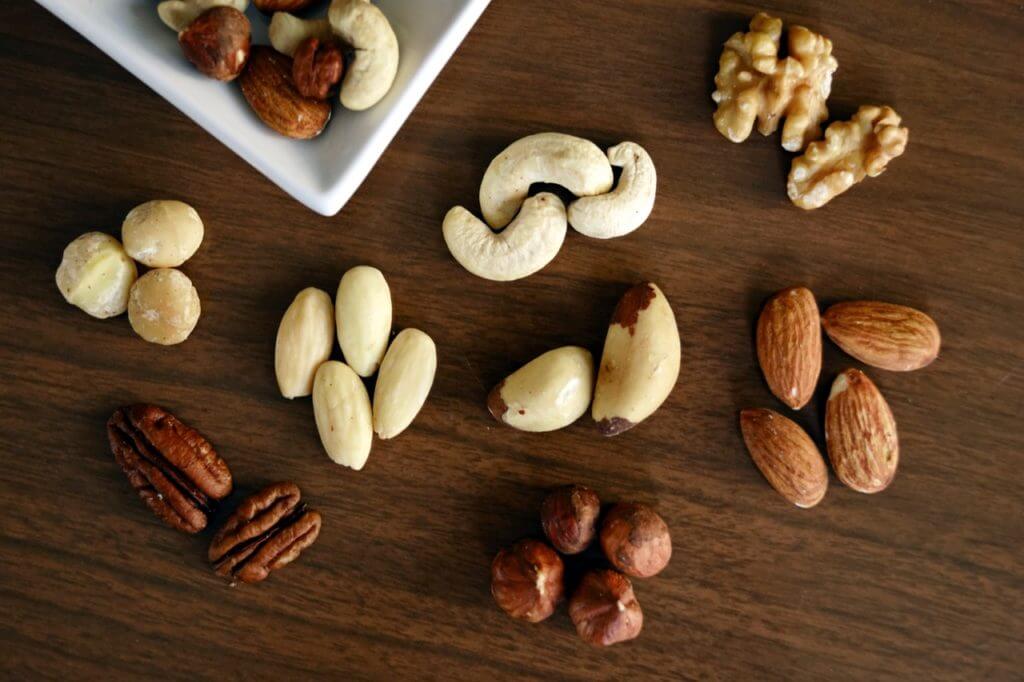Almonds and cashews are arguably the 2 most popular nuts and easiest to find in stores.
I’ve created a short head-to-head comparison so that we can look at aspects like calories, protein, nutrients, and omega fats.
Note that all data on this page is per 100 grams of each nut.
Table of Contents
Nutritional Value Comparison of Almonds and Cashews
Let’s start by looking at the macronutrients of these 2 nuts:
| Almonds | Cashews | |
|---|---|---|
| Energy (kcal) | 579.6 | 573.7 |
| Protein (g) | 21.1 | 15.3 |
| Total Lipid (g) | 49.9 | 46.4 |
| Carbohydrate (g) | 21.6 | 32.7 |
| Fiber (g) | 12.6 | 3.1 |
| Sugars (g) | 4.4 | 5.0 |
While they have a similar amount of fat and calories, there are a few significant differences:
- Almonds have about 40% more protein
- Almonds have fewer carbohydrates and more fiber
Omega 3 and 6 Fats in Almonds vs Cashews

Of all the types of fats, omega fats in nuts are the most important when it comes to health.
See my page on the omega 3 to 6 fat ratios of nuts to see data for other nuts as well.
| Almonds | Cashews | |
|---|---|---|
| Omega 3 Fats | 0.052 | 0.161 |
| Omega 6 Fats | 14.5 | 7.66 |
| Omega 6:3 Ratio | 278.85 | 47.58 |
Ideally, you want as low of an omega 6:3 fat ratio as possible (under 4:1).
As you can see, cashews do have a better omega 6 to 3 fat ratio, but they’re both terrible.
It’s okay to have some foods with a poor omega fat ratio in your diet, but this tells you that you should limit your intake of these nuts in particular.
Vitamins and Minerals in Almond and Cashew Nuts
Finally, let’s look at micronutrients in both of these nuts.
The table below only contains vitamins and minerals that are present in either of the nuts in significant amounts.
They are roughly sorted by the general RDA that I’ve included for each nutrient. Note that RDA changes based on age and gender, so this is just to give you a reference.
| RDA | Almonds | Cashews | |
|---|---|---|---|
| Vitamin E (mg) | 15 | 25.6 | 0.9 |
| Manganese (mg) | 2.3 | 2.2 | 0.8 |
| Riboflavin (mg) | 1.3 | 1.1 | 0.2 |
| Phosphorus (mg) | 700 | 481.5 | 490.5 |
| Magnesium (mg) | 400 | 270.4 | 259.9 |
| Zinc (mg) | 11 | 3.1 | 5.6 |
| Vitamin K (µg) | 75 | 0.0 | 34.7 |
| Potassium (mg) | 2000 | 733.3 | 565.0 |
| Iron (mg) | 18 | 3.7 | 6.0 |
| Niacin (mg) | 16 | 3.6 | 1.4 |
| Calcium (mg) | 1200 | 268.5 | 45.3 |
| Selenium (µg) | 55 | 4.1 | 11.7 |
| Vitamin B-6 (mg) | 1.3 | 0.1 | 0.3 |
| Thiamin (mg) | 1.2 | 0.2 | 0.2 |
| Folate (µg) | 400 | 44.4 | 68.6 |
| Choline (mg) | 550 | 52.0 | 61.0 |
It might be a bit unexpected that while they both contain a lot of the same nutrients, the amounts of them are significantly different in many cases:
- Almonds contain significantly more vitamin E, manganese, riboflavin, niacin, and calcium
- Cashews contain significantly more zinc, vitamin K, iron, and selenium
Depending on your diet, some of those may be worth prioritizing. For example, vegans often lack iron.
Almonds vs Cashews: Which is Healthier?
For most diets, almonds would be considered healthier than cashews as they contain more protein and fiber. However, both nuts contain a significant amount of vitamins and minerals like vitamin E, magnesium, zinc, calcium, and iron. Almonds and nuts also both have poor omega 3 to 6 fat ratios and should be consumed in limited amounts.
Are Almonds or Cashews Better for Weight Loss?
Neither almonds or cashews are particularly better for weight loss. They both have a near identical amount of calories and high levels of fats (which are filling). However, some people find protein more filling than carbohydrates, which may make almonds a better choice for weight loss for them.
Are Almonds or Cashews Better for Bodybuilding?
Because almonds have almost 40% more protein with the same amount of calories, almonds are the better nut for bodybuilding. Both nuts are very high in calories, making them ideal for gaining weight, but not great when a bodybuilder is trying to lose body fat.
